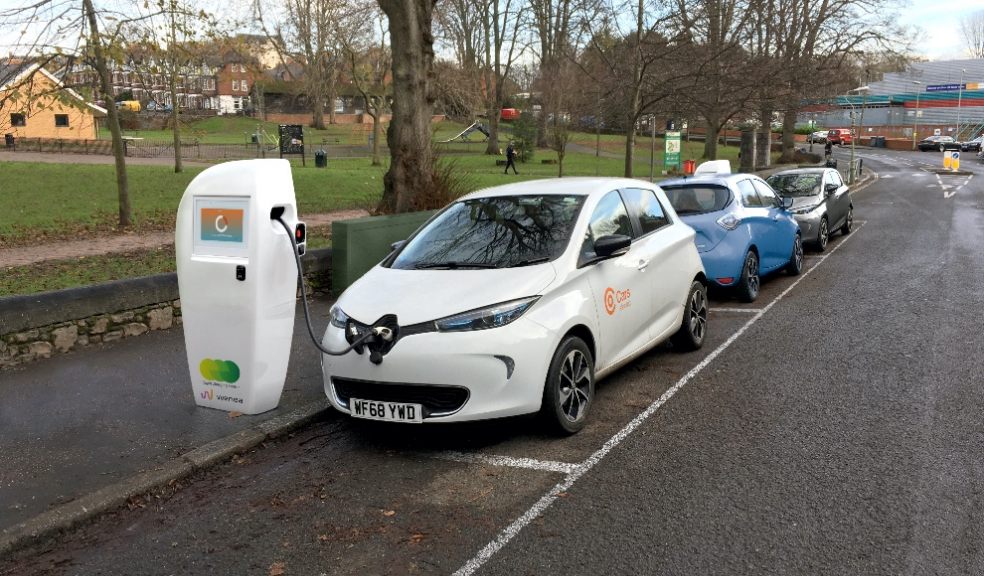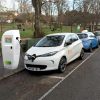
Rapid electric vehicle chargers given the green light
Twenty-seven neighbourhoods across Teignbridge, Exeter and East Devon are set to receive state of the art rapid electric vehicle charging points.
It follows Devon County Council’s highways committees giving the plans the green light.
The charging ‘hubs’ are the next phase of a private-sector led scheme that includes Devon County Council, Regen, Co Cars, ZPN Energy and Gamma Energy.
Funded by Innovate UK and the Office for Zero Emission Vehicles, the scheme aims to deliver a network of charge points across Exeter and the surrounding area over the next two years.
These latest plans follow the approval of eight sites in Exeter earlier this year.
In Teignbridge the 12 new sites include St Pauls Road, Courtenay Park Road and Osbourne Street in Newton Abbott; Lower Brook Street Car Park, Shute Hill and Den Crescent in Teignmouth and Lawn Drive in Chudleigh, with both the Lower Brook Street and Den Crescent sites including a publicly hireable electric Co Car.
The remaining sites are St John’s Lane and Mary Street in Bovey Tracey, Brunswick Place in Dawlish, Newton Road in Kingsteignton and Court Street Moretonhampstead.
In Exeter the sites are Blackall Road, Sydney Road, Gloucester Road, Buddle Lane, West Avenue, Hamlin Lane, Barnfield Hill, Gladstone Road, Iddesleigh Road, St Leonards Road, Aldens Road, Exwick Health Centre, Mallard Road, Pinhoe Road and Holman Way in Topsham.
The Pinhoe Road, Gladstone Road, Hamlin Lane, Buddle Lane, Sydney Road and Holman Way sites will also have a Co Car.
And in East Devon the three sites are St Andrews Road and Halsdon Road in Exmouth and Younghayes Road in Cranbrook, with this site including a Co Car.
This project is part of a nationwide move to reduce carbon emissions and improve air quality - the government has announced a ban on the sales of new cars and vans powered wholly by petrol and diesel from 2030. A key aim is to increase local access to electric vehicle charging points for those areas where people can only park on the street.
The rapid chargers have been developed by ZPN Energy, while Gamma Energy, based at Exeter Science Park, has developed the renewable energy technology that will power the chargers. The rapid chargers use a cutting-edge energy storage system enabling vehicles to charge very quickly.
A typical unit will provide 75 miles of travel after 30 min of charge (25Kwh) at a cost of £7.50 (30p per kWh).
Councillor Stuart Hughes, Devon County Council Cabinet Member for Highways Management, said: “We know that many are seriously considering buying an electric vehicle and access charging points will be a major factor in their decision.
“DCC has been working with a number of partners recently including Highways England and the district councils to deliver a network of charging points across the county.
“This exciting project with the public sector is a major part of that and will give residents access to charge points in the heart of their communities.”
Olly Frankland from Regen, said: "Many people across the city currently have no way of charging an electric vehicle at home. This removes that barrier and makes electric car use a reality.”
Ian Stillie, ZPN Energy, CEO, said: "With EV ownership fast becoming more widespread and progressively tough legislation to reduce emissions, we are excited to bring our sustainable, user-friendly HUBZ charging units to cities and towns across Devon, rapidly expanding the EV charging infrastructure.”
Gamma Energy has developed the technology to power the chargers using 100% clean energy.
Jose Contreras, Gamma Energy said: “We are pleased to be moving into these next phases of the project with further sites identified and approved across the city, helping to build the robust charging network that is needed. With Co Cars being part of the offering across many sites, the project will also help open up affordable access to electric vehicles and reduce vehicles on our streets as people are offered more flexible travel options.”




















